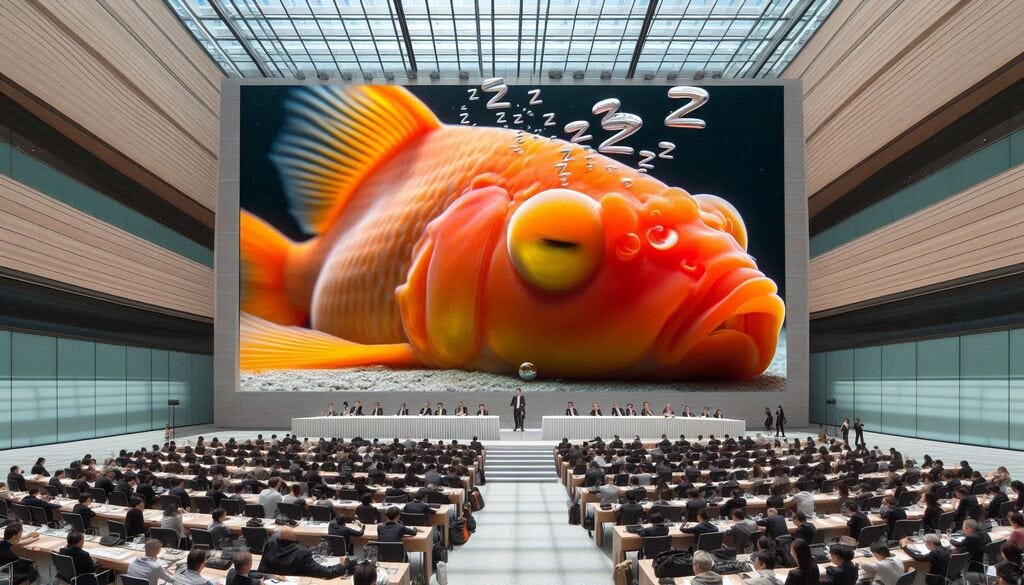Do we really have the attention span of a goldfish?
Why most conferences should limit speakers to 20 minutes - or less
Conferences are a fantastic way to share ideas, inspire action, connect with others, and even more so after the pandemic. Yet, having had a front-row seat at more than a fair share of conferences, I know too well that not all conference sessions are created equal. Some leave attendees buzzing with excitement, while others feel like they drag on forever.
When it feels like a marathon of slides and overlong monologues you often wonder, is it only me? Do I really have the attention span of a goldfish?
While it’s a popular tale that goldfish (9 seconds) now have longer attention spans than humans, it’s fictional.
"Human attention spans are task-driven and varied. What is undisputed is that it is far harder for us to focus on a single task at hand when our phones and other nearby devices cause wanted and unwanted distractions, explains Cobus Heyl, founder of That Coalition.
Having compiled speaker programmes for events since 2013, Cobus likens mobile phones at conferences to “get-out-of-jail cards in the pockets of the audience". They spark two common behaviours during speaker sessions:
Engaged sharing: Attendees snap photos of slides or moments they want to remember or share.
Attention drift: When focus wanes, attendees turn to their phones for a quick dopamine hit.
To combat this “goldfish effect,” shortly before the pandemic, Cobus made a bold move: shortening speaker sessions at his conferences to only 20 minutes, including intros and outros. And from the outset, he made it clear that no compromises would be made. Too often, conferences prioritise speaker prestige or institutional norms over the attendee experience.
“The idea was met with incredulity to downright dismay,” he recalls, “but ultimately, it worked very well and since those early protestations I have not had any more complaints.”
The decision wasn’t random, Cobus explains. He cites event psychologist Victoria Matey, who describes shorter talks as “brain-friendly.” The wildly successful TED Talk model supports this, capping its presentations at 18 minutes: “This is the maximum,” their website declares, “not the goal of every talk.”
Two things happen when speakers are given less time:
Energy stays high: Shorter sessions keep the room buzzing. People are more likely to stay engaged, knowing the next speaker or break is just around the corner.
Quality improves: “Constraints breed excellence,” Cobus says. When time is limited, speakers are forced to distill their message to its essence - resulting in talks that hit harder and leave a lasting impression.
Having attended conferences organised by Cobus from Vegas to Wuhan, I’ve seen this approach in action, and the results are there for everyone to see. They all felt more dynamic and vibrant. Instead of the dreaded mid-afternoon slump, there’s a consistent hum of energy. Attendees stayed engaged, and speakers brought their best, knowing they had just 20 minutes to make an impact. Even the offstage chatter and networking have a sprightliness that I often see fade when audience attention is stretched in the conference hall.
I'm quite surprised more event organisers haven’t adopted this model. Sure, some events - medical or engineering conferences, perhaps - may require longer sessions for technical discussions. Cobus acknowledges this: “Ultimately, the suitable duration will differ from event to event, speaker to speaker, and topic to topic,” Cobus says. “Just make sure you programme for the benefit of the audience, not for egos.”
For me, especially in the B2B space, and particularly in industries like media and marketing, shorter talks work better. It compels speakers to refine their message, ensuring clarity, impact, and respect for the audience while keeping sessions dynamic and engaging. This format not only boosts energy and variety but also fosters excellence by challenging speakers to deliver their best in a concise timeframe.
When it comes to speaker presentations, don’t let your audience swim in circles - keep it short, keep it sharp, and keep them hooked.


